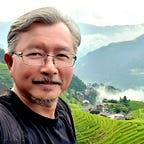Wuchang Fish
Day Thirty Three
Wuhan was in the news two years ago as we prayed for the city in lockdown as the coronavirus epidemic began. My heart went out to the citizens as I have friends there, having first visited there 22 years ago. Wuhan is made up of three towns of Hankou, Hanyang and Wuchang.
I read about 19th century Hankou when Hudson Taylor visited with Griffith John in the late 1880s, revealing the fact that foreigners were already making residence there in the port city along the Yangzi River. Later the historic Republican Revolution in China happened in 1911 because of the Wuchang garrison took up arms (by accident) and sparked the secession which toppled the last Imperial dynastic rule in China.
Wuhan is a historic city in many ways, and home to many universities so that it was affectionately called Daxue cheng (the city of universities). What a joy it must be to be able to study there and wander around the huge lake called Donghu (East Lake) which is nearly half the size of Singapore city. Like Singapore, Wuhan is also a very hot and humid place especially in the mid-summer (actually much hotter than Singapore) so much so that it is called one of the furnances of China.
I have often wished to be able to join the hordes of people fishing by the Donghu lake, under the shade of the trees lining the sides of the lake, with their long and thick fishing rods, angling for the Wuchang fish. When I first visited Wuhan in 2000, hosted by the foreign affairs department of the city government, we were introduced to the Wuchang fish by the officials at the dinner table.
The official who was the table host introduced us to the famous dictum of Chairman Mao’s which expressed his joy when he tasted the Wuchang fish saying, “I have just drank Changsha water (from his hometown in Hunan) and now I am savouring Wuchang fish (in Hubei)”. It was the opening lines in his famous poem. Later when I visited Erzhou city (another city in Hubei) and was hosted by the mayor of the city, he offered us the same fish delicacy. It was when I learnt that the Wuchang fish is native to the city in Liangzi Hu ( linked to Yangzi River by a tributary).
Over the next two years, we brought youth volunteers to serve in a hospital for mentally ill in Wuhan as well as in a rural school and a home for the elderly in Erzhou. At the beginning of each team’s visit, the local hosts served up Wuchang fish and I shared with them the famous lines of Mao Zedong in connection with the fish delicacy. They too savoured the fish with delight like Chairman Mao did.
Over the course of 3 weeks, they were able to recite Mao’s lines as well as the poems of Li Bai, after their visit to the Yellow Crane Pagoda (Huanghe Lou) where the Tang poet had crafted a few famous verses in remembrance of friendships forged in the city. They also got to learn about the historical significance of the city in the 20th century with the Xinhai Revolution of 1911. Most were intrigued by the history of the city in connection with the stories of the Three Kingdoms.
The interesting thing was that by the end of 3 weeks, the Wuchang fish had lost its appeal, not only because of the fresh-water taste (compared to the more familiar tastes of sea-water fish we get back home in Singapore) but also because of the many tiny bones in the fish. When they were served the meal with the Wuchang fish laid out, they had begun to recite Mao’s lines with an emphasis that they were eating Wuchang fish again! Culture shock had begun to set in.
Wuhan, like many cities in China, has a long history with illustrious heroic figures with great exploits to inspire us. We may get weary of good food including the famed Wuchang fish, but hopefully we will not grow weary of doing good. May we like the residents of Wuhan rise up again even when tragedy befalls us, as the past can help us envision the future and energise our present.
Journey with me as I reflect on life and hope in the wilderness of Asia
See previous day’s reflection on Changes. See next days reflection on Shanxi Migrants
